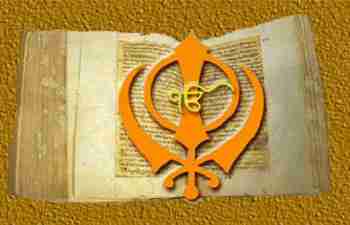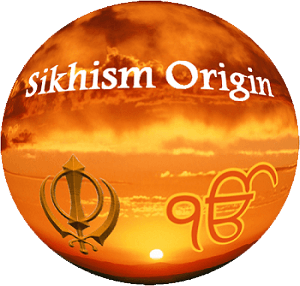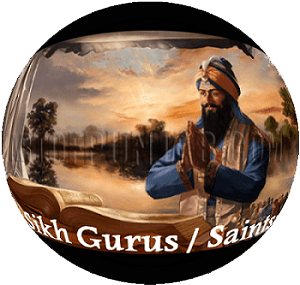- Sikh Literature (Writting Collection) -

Japji Sahib
The Japji hymn by Guru Nanak is considered to be the key to Sri Guru Granth Sahib and an epitome of the Sikh doctrine. It appears as the first poem in Sri Guru Granth Sahib and is repeated by Sikhs in their morning prayers, as well as when preparing Amrit for the Khalsa baptism ceremony. Japji lays stress on the brotherhood of man and remembrance of God as the key to salvation. The Japji Sahib appears in it's original Gurmukhi with romanized pronunciation guide and english translation.
Tav-Prasad Savaiye
Part of the daily prayers prescribed for Sikhs, the poem Tav-Prasad Savaiye by Guru Gobind Singh is usually read after Japji and Jap in the mornings. In it Guru Gobind Singh expounds the uselessness of rituals and blind faith without sincere worship of God. It is found in the Dasam Granth, the collection of the writings of Guru Gobind Singh.
Zafarnama
Known as the Letter of Victory, Zafarnama was written in Persian by Guru Gobind Singh as a letter of defiance and delivered to the Mughal Emperor Aurangzeb in 1707. It was composed by Guru Gobind Singh in one of the darkest times for the Sikhs. Guru Gobind Singh had lost his four sons. The letter praises God and then outlines the bloody battle of Chamkaur and the treachery of Aurangzeb and the Mughals who broke their oath not to attack the Sikhs. Zafarnama is important to Sikhs because it contains the doctrine of the use of force being justifiable if all other peaceful means have failed.
Anand Sahib
One of the daily prayers, Anand by Guru Amar Das is the 'Song of Eternal Bliss and Joy'. It is composed of 40 stanzas and is also recited by the five beloved ones during the Khalsa initiation ceremony.
Vachitra Natak
Part of The Vachitra Natak meaning 'The Wonderous Drama' by Guru Gobind Singh, Chapter V narrates the succession of the first nine Gurus preceding Guru Gobind Singh. It emphasizes that all the Gurus were the same spirit and praises the great martyrdom of Guru Tegh Bahadur who died to preserve the concept of freedom of religion. The Vachitra Natak is a very detailed account of the life of Guru Gobind Singh written by Himself, it appears in the Dasam Granth and is the only existing autobiography of any Guru.
Gun Gobind gaio nahin janamu akarth kin
The second last poetical composition in Sri Guru Granth Sahib, Gun Gobind gaio nahin janamu akarth kin is a poem of 57 couplets written by Guru Tegh Bahadur. In it Guru Tegh Bahadur criticizes those who are attached to the illusion of the material world (maya, mammon) and have forgotten God, the Guru urges man to remember God at all times.
Ardas
A concise history of the Sikhs, Ardas is used as the common prayer. It is recited whenever starting or ending any reading of Sri Guru Granth Sahib or any other important task. The first part of it appears as a prologue to Chandi Di Var written by Guru Gobind Singh invoking blessings of God and the Gurus. The remainder of the bulk was incorporated by the great Sikh scholar Bhai Mani Singh. Further additions have been added over time taking into account major events affecting Sikhs.
Lawan
During the Sikh marriage ceremony called Anand Karaj, the Lawan is read from Sri Guru Granth Sahib. There are four main stanzas to this poem written by Guru Ram Das. In unison with the reading of each of the four stanzas, the bride and groom complete a circle around the Guru Granth Sahib.
Sidhha Gosth
Unlike traditional poetical compositions of Sri Guru Granth Sahib, Sidhha Goshth is a record of the conversation between Guru Nanak and the Sidhhas, a group of Nanth Yogis which the Guru met on his travels to the Himalayan mountains. 'Goshth' means discussion, Sidhha Goshth is the detailed transcript of the questions posed to Guru Nanak by the Yogis and the Gurus answers. It is a great philosophical discussion in which the Guru answers the Yogis questions about the meaning of life, God and creation.
Kabitas
Selections from a chapter from the Akal Ustati (In Praise of God, The Immortal) Kabitas (71 to 90) by Guru Gobind Singh denounces blind rituals. The Akal Ustati is a lengthy poem composed by Guru Gobind Singh which appears in the Dasam Granth.
Kirtan Sohila
The bedtime prayer, Kirtan Sohila is usually recited just before sleeping at night. It's name means 'Song of Peace'. Kirtan Sohila is composed of five hymns, the first three by Guru Nanak Dev, the fourth by Guru Ram Das and the fifth by Guru Arjan Dev. This hymn is usually recited at the conclusion of evening ceremonies at the Gurdwara and also recited as part of Sikh funeral services.
Babur Bani
The fight against social and political injustice has historically been an integral part of Sikhism. As a religious leader Guru Nanak did not turn a blind eye to political supression or consider it outside the realm of religion, but undertook political protest through his writings, speaking out against the cruelty of rulers. Guru Nanak wrote a number of passages about the Mughal invasion of India by Babur and the brutalities that he eyewitnessed first hand (Babur Bani). Guru Nanak also spoke out about the suffering of people at the hands of unscrupulous rulers and government officials







